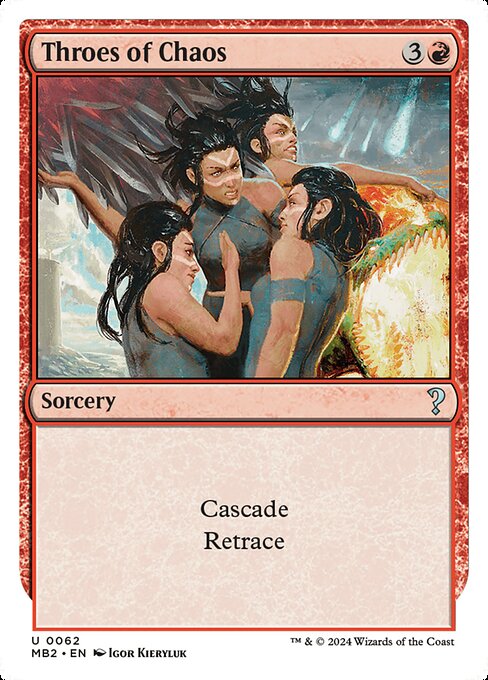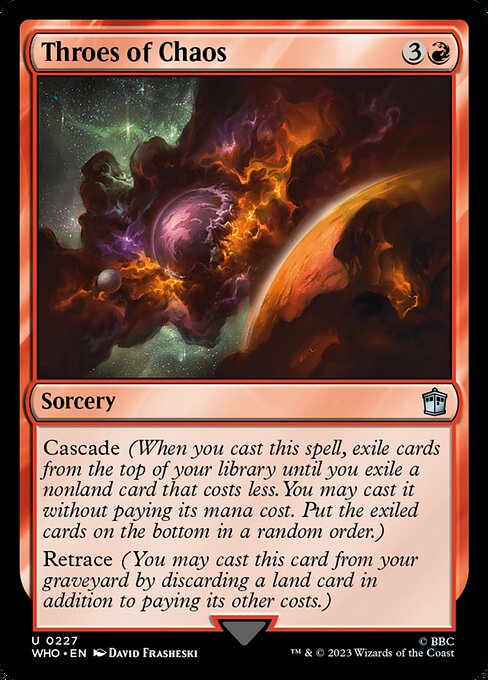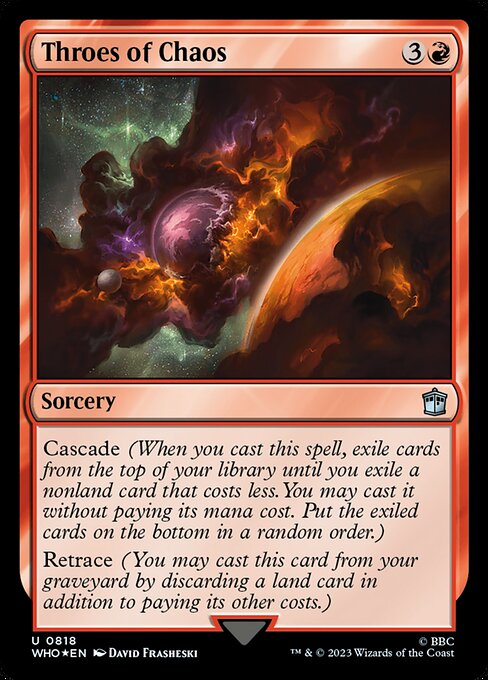Aguijonazos del caos
Conjuro
Cascada. (Cuando lances este hechizo, exilia cartas de la parte superior de tu biblioteca hasta que exilies una carta que no sea tierra y que cueste menos. Puedes lanzarla sin pagar su coste de maná. Pon las cartas exiliadas en el fondo de tu biblioteca en un orden aleatorio.)
Desandar. (Puedes lanzar esta carta desde tu cementerio descartando una carta de tierra además de pagar sus otros costes.)
Desandar. (Puedes lanzar esta carta desde tu cementerio descartando una carta de tierra además de pagar sus otros costes.)
standard
future
historic
gladiator
pioneer
explorer
modern
legacy
pauper
vintage
penny
commander
brawl
alchemy
paupercommander
duel
oldschool
premodern
Rulings
Throes of Chaos does nothing as it resolves. All of its chaos happens before it resolves.
When a spell you cast with retrace resolves or is countered, it's put back into your graveyard. You may use the retrace ability to cast it again.
A spell's mana value is determined only by its mana cost. Ignore any alternative costs, additional costs, cost increases, or cost reductions.
The mana value of a split card is determined by the combined mana cost of its two halves. If cascade allows you to cast a split card, you may cast either half but not both halves.
When the cascade ability resolves, you must exile cards. The only optional part of the ability is whether or not you cast the last card exiled.
Cascade triggers when you cast the spell, meaning that it resolves before that spell. If you end up casting the exiled card, it will go on the stack above the spell with cascade.
If you cast a card “without paying its mana cost,” you can't choose to cast it for any alternative costs. You can, however, pay additional costs. If the card has any mandatory additional costs, you must pay those to cast the card.
If a spell with cascade is countered, the cascade ability will still resolve normally.
Due to a recent rules change to cascade, not only do you stop exiling cards if you exile a nonland card with lesser mana value than the spell with cascade, but the resulting spell you cast must also have lesser mana value. Previously, in cases where a card's mana value differed from the resulting spell, such as with some modal double-faced cards or cards with an Adventure, you could cast a spell with a higher mana value than the exiled card.
If the card has in its mana cost, you must choose 0 as the value of X when casting it without paying its mana cost.
You exile the cards face up. All players will be able to see them.
When a spell you cast with retrace resolves or is countered, it's put back into your graveyard. You may use the retrace ability to cast it again.
A spell's mana value is determined only by its mana cost. Ignore any alternative costs, additional costs, cost increases, or cost reductions.
The mana value of a split card is determined by the combined mana cost of its two halves. If cascade allows you to cast a split card, you may cast either half but not both halves.
When the cascade ability resolves, you must exile cards. The only optional part of the ability is whether or not you cast the last card exiled.
Cascade triggers when you cast the spell, meaning that it resolves before that spell. If you end up casting the exiled card, it will go on the stack above the spell with cascade.
If you cast a card “without paying its mana cost,” you can't choose to cast it for any alternative costs. You can, however, pay additional costs. If the card has any mandatory additional costs, you must pay those to cast the card.
If a spell with cascade is countered, the cascade ability will still resolve normally.
Due to a recent rules change to cascade, not only do you stop exiling cards if you exile a nonland card with lesser mana value than the spell with cascade, but the resulting spell you cast must also have lesser mana value. Previously, in cases where a card's mana value differed from the resulting spell, such as with some modal double-faced cards or cards with an Adventure, you could cast a spell with a higher mana value than the exiled card.
If the card has in its mana cost, you must choose 0 as the value of X when casting it without paying its mana cost.
You exile the cards face up. All players will be able to see them.
Rulings
Throes of Chaos does nothing as it resolves. All of its chaos happens before it resolves.
When a spell you cast with retrace resolves or is countered, it's put back into your graveyard. You may use the retrace ability to cast it again.
A spell's mana value is determined only by its mana cost. Ignore any alternative costs, additional costs, cost increases, or cost reductions.
The mana value of a split card is determined by the combined mana cost of its two halves. If cascade allows you to cast a split card, you may cast either half but not both halves.
When the cascade ability resolves, you must exile cards. The only optional part of the ability is whether or not you cast the last card exiled.
Cascade triggers when you cast the spell, meaning that it resolves before that spell. If you end up casting the exiled card, it will go on the stack above the spell with cascade.
If you cast a card “without paying its mana cost,” you can't choose to cast it for any alternative costs. You can, however, pay additional costs. If the card has any mandatory additional costs, you must pay those to cast the card.
If a spell with cascade is countered, the cascade ability will still resolve normally.
Due to a recent rules change to cascade, not only do you stop exiling cards if you exile a nonland card with lesser mana value than the spell with cascade, but the resulting spell you cast must also have lesser mana value. Previously, in cases where a card's mana value differed from the resulting spell, such as with some modal double-faced cards or cards with an Adventure, you could cast a spell with a higher mana value than the exiled card.
If the card has in its mana cost, you must choose 0 as the value of X when casting it without paying its mana cost.
You exile the cards face up. All players will be able to see them.
When a spell you cast with retrace resolves or is countered, it's put back into your graveyard. You may use the retrace ability to cast it again.
A spell's mana value is determined only by its mana cost. Ignore any alternative costs, additional costs, cost increases, or cost reductions.
The mana value of a split card is determined by the combined mana cost of its two halves. If cascade allows you to cast a split card, you may cast either half but not both halves.
When the cascade ability resolves, you must exile cards. The only optional part of the ability is whether or not you cast the last card exiled.
Cascade triggers when you cast the spell, meaning that it resolves before that spell. If you end up casting the exiled card, it will go on the stack above the spell with cascade.
If you cast a card “without paying its mana cost,” you can't choose to cast it for any alternative costs. You can, however, pay additional costs. If the card has any mandatory additional costs, you must pay those to cast the card.
If a spell with cascade is countered, the cascade ability will still resolve normally.
Due to a recent rules change to cascade, not only do you stop exiling cards if you exile a nonland card with lesser mana value than the spell with cascade, but the resulting spell you cast must also have lesser mana value. Previously, in cases where a card's mana value differed from the resulting spell, such as with some modal double-faced cards or cards with an Adventure, you could cast a spell with a higher mana value than the exiled card.
If the card has in its mana cost, you must choose 0 as the value of X when casting it without paying its mana cost.
You exile the cards face up. All players will be able to see them.
Your collection? Your decks?
Want to manage your collection and/or create decks?
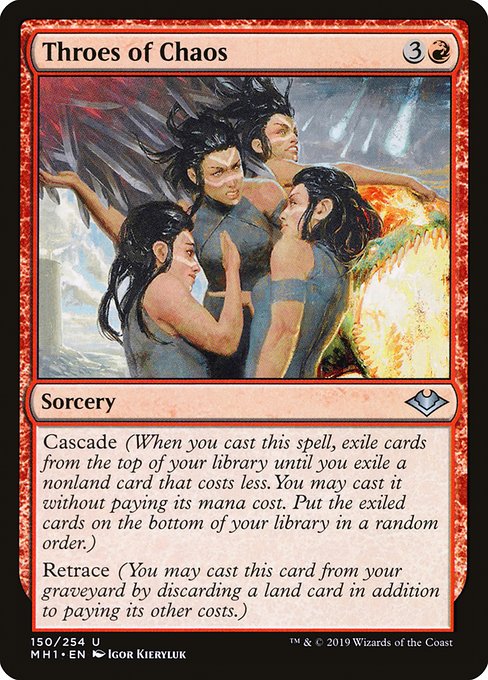

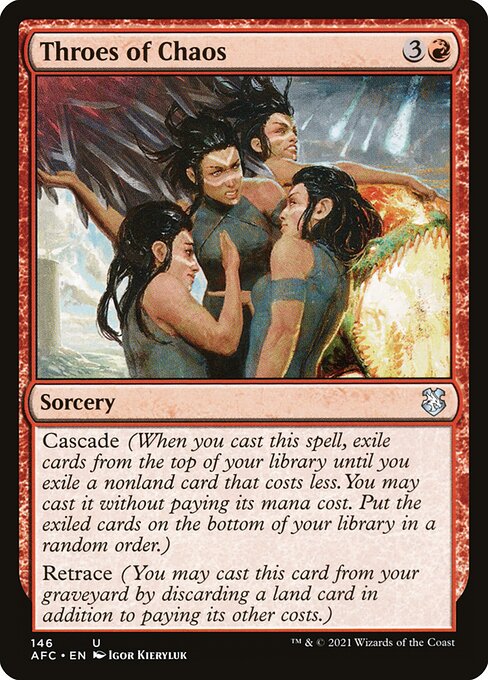
 0
0
 0.11€
0.11€
